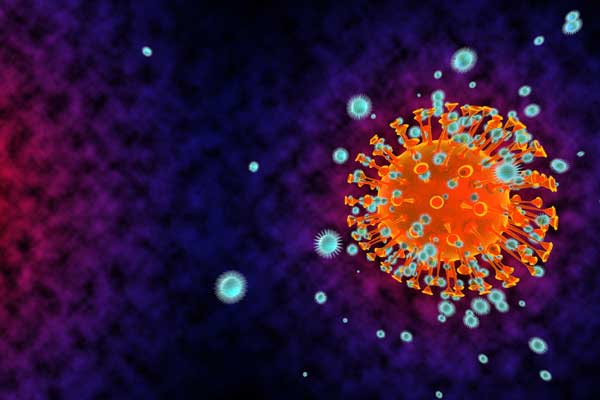
A 3-D rendering of antibodies attaching to a virus, like COVID-19. Photo by Kittipong053/Shutterstock
Could horse antibodies become a treatment for COVID-19? That is one of the questions posed by medical researchers who are trying to develop treatments for the disease caused by the novel coronavirus (aka SARS-CoV-2).
While the international race to develop a vaccine to immunize humans against COVID-19 intensifies, a group of Argentinian researchers have begun human clinical trials on a serum using antibodies derived from horses that could be used as a treatment for people that have the disease. Researchers believe the serum will slow the replication rate of the virus, which lowers the viral load or the amount of virus in the body, and provide already infected human patients with enough time to build their own immune response, says Inmunova, a Buenos Aires-based biotech company.
According to the firm’s website, researchers, including Argentinian equine science specialists, developed the equine hyperimmune serum by inoculating horses with fragments of SARS-CoV-2. That virus infects the cells of a horse’s lungs and other organs through a protein that binds to a receptor and causes the animal to mount an immune response and generate a large amount of neutralizing antibodies.
Plasma is then extracted from the horse, purified, and processed before it is incorporated into a serum to be used to treat human COVID-19 patients.
According to Fernando Goldbaum, Inmunova’s director of scientific research, the use of horses in the production of the serum is highly efficient.
“Equine is a biofactory,” says Goldbaum. “With very few horses, you can get a lot of serum.”
Horse Antibodies Treating Other Diseases Beyond COVID-19
In fact, producing a serum using antibodies derived from horses to treat diseases in humans is not new, says Peter Timoney, MVB, MS, PhD, FRCVS, of the Gluck Equine Research Center in Lexington, Ky. He is one of the world’s leading experts on equine infectious diseases.
According to Timoney, an equine-derived tetanus antitoxin was used in the past to treat tetanus in humans. Its use is now discontinued due to the risks of hypersensitivity or serum sickness in those being treated, he says. Serum sickness is an allergic reaction to a serum injection characterized by skin rash, joint stiffness and fever.
“It has been replaced by human tetanus immunoglobulin,” Timoney explains. “Equine derived botulism antitoxin is still used however in some countries for the treatment of various forms of human botulism, especially in infants.”
Welfare Considerations
In the case of COVID-19 research, Timoney believes that inoculating the horses with fragments of SARS-CoV2 should not put their health or welfare at risk, so long as the animals are properly cared for to begin with.
“In that regard, full consideration must be given to upholding appropriate standards of welfare in the management and veterinary care of the animals prior to and subsequent to inoculation with the viral preparation,” he says.
On July 29, an Argentinian consortium including Inmunova, the Argentine Biological Institute, Argentina’s National Administration of Laboratories and Health Institutes, the Leloir Institute Foundation, mAbxience, National Scientific and Technical Research Council (CONICET) and the National University of General San Martín announced that it has begun clinical trials to test the effectiveness of the hyperimmune serum in humans by administering the serum to 242 people who have been diagnosed with the disease, but who do not require intensive care or the use of a respirator.
Initial results of the trials are expected in October or November 2020, according to Inmunova’s website.
The company did not disclose expected results or the percentage of serum sickness anticipated in trial participants. In addition, it is not yet known exactly how the treatment might be distributed in the Argentine and international markets if it is proven effective in the fight against COVID-19.
Meanwhile, Paul Richards, chief of the Consumer Affairs Branch of the U.S. Food and Drug Administration’s (FDA) Center for Biologics Evaluation and Research , says that the FDA is working with drug and biological product makers to bring COVID-19 treatments to the US market.
“The FDA is working with drug and biological product manufacturers, and investigational new drug applicants, to expedite the development and availability of COVID-19 treatments and stands ready to work with medical product developers to clarify regulatory and data requirements necessary to move products forward in development as quickly as possible,” says Richards.
Should this horse antibody serum treatment show promise for defeating COVID-19, it is too early to determine if, how, or when it would become available in the U.S. Time will provide more answers on effectiveness and the possibility of its future use on a larger scale to help those infected with COVID-19.



